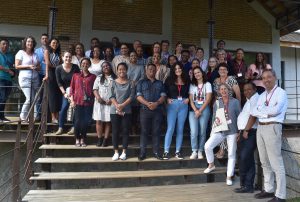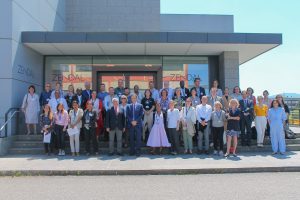News
Second annual progress meeting, 27-28 May 2024
On May 27-28 2024, the second progress meeting of the MTBVACN3 project took place in Pilanesberg, near Johannesburg in South Africa. During these days the consortium partners met to share experiences and review the progress of the study after one year of the start of recruitment. They got the opportunity to visit Wits Vida and gain insight into their facilities. To date, 2,300 infants  have been vaccinated across the 6 recruiting centers. The MTBVACN3 phase 3 efficacy trial aims to evaluate the efficacy, safety, and immunogenicity of the vaccine administered in Healthy HIV Unexposed and HIV-Exposed Uninfected Newborns in tuberculosis (TB)-endemic regions of sub-Saharan Africa such as South Africa, Senegal and Madagascar. MTBVAC is one of the promising TB vaccine candidates for newborns. The target is to vaccinate 7,120 newborns against tuberculosis during their first week of life.
have been vaccinated across the 6 recruiting centers. The MTBVACN3 phase 3 efficacy trial aims to evaluate the efficacy, safety, and immunogenicity of the vaccine administered in Healthy HIV Unexposed and HIV-Exposed Uninfected Newborns in tuberculosis (TB)-endemic regions of sub-Saharan Africa such as South Africa, Senegal and Madagascar. MTBVAC is one of the promising TB vaccine candidates for newborns. The target is to vaccinate 7,120 newborns against tuberculosis during their first week of life.
First annual project meeting, 15-18 May 2023
From 15-18 May 2023, the first annual progress meeting of the MTBVAC phase III clinical trial EDCTP co-funded project took place in Andasibe and Antananarivo, Madagascar.
The consortium, composed of nine partners in total of which six recruiting sites (four in South Africa, one in Senegal and one in Madagascar), informally and formally discussed the project progress achieved in the recent 12 months. The attendees visited the Institut Pasteur de Madagascar in Antananarivo with its research and clinical labs and vaccination facilities.
At the meeting venue, a comprehensive update and overview of the overall project progress was presented by all partners and insights into the clinical trial status were discussed. The sites are recruiting at an increasing rate, with almost 300 newborns by May, 2023. MTBVACN3 will evaluate safety and efficacy of MTBVAC administered intradermally in 7120 healthy, BCG-naïve, HIV-uninfected newborns born to HIV-uninfected mothers and HIV-infected mothers without known exposure to close/household TB contacts.
All in all, the days hosted by the IPM-team, provided a platform to share extensively experiences, challenges and solutions and to look forward to the next steps in the project.
First Site Initiation Visit
23 September the first Site Initiation Visit (SIV) of the clinical trial “MTBVAC in Newborns: Randomised, Double-blind Controlled Phase 3 Trial to Evaluate the Efficacy, Safety, and Immunogenicity of MTBVAC Administered in Healthy HIV Unexposed and HIV Exposed Uninfected Newborns in Tuberculosis-endemic Regions of Sub-Saharan Africa” was performed. This first visit took place at the South African Tuberculosis Vaccine Initiative – University of Cape Town (SATVI-UCT), one of the six different clinical sites across Africa.
Kick off Meeting MTBVAC Phase III
From 10-12 May 2022, the Kick-off Meeting (KoM) of the MTBVAC phase III clinical trial EDCTP co-funded project was held in Baiona, Spain. With the only licensed TB vaccine, Bacillus Calmette-Guérin (BCG), having limited impact on prevention of TB disease and transmission of Mycobacterium tuberculosis, there is an urgent need for a new, improved TB vaccine. MTBVAC is a live attenuated M. tuberculosis-based vaccine with two major virulence factors removed, which is currently entering a randomised, double-blinded, active BCG-controlled phase III clinical trial. This study will evaluate the safety and efficacy of MTBVAC administered by intradermal route in 7120 healthy, BCG-naïve, HIV-uninfected newborns born to HIV-uninfected mothers and HIV-infected mothers without known exposure to close/household TB contacts.
For three days, members of the MTBVACN3 consortium had the opportunity to get to know each other and discuss the details of this study. During the first session, the design of this project was outlined, including an update on the work done so far and a description of the trial endpoints and safety considerations. This general overview provided the frame to further discuss the protocol parameters on the second day, including the statistical design, procedures, timelines, and logistics involving vaccine distribution and sample management. In two dedicated break-out sessions the participants therefore put together and discussed the most urgent and important risk issues and a management plan and shared their expertise with community engagement. Both sessions strongly underlined the importance of efficient exchange of knowledge and being optimally prepared well in advance to ensure successful performance and completion of this study.
The team is excited to enter this important next phase!
Publications
-
Efficacy, Safety and Immunogenicity Evaluation of MTBVAC in Newborns in Sub-Saharan Africa (MTBVACN3) ClinicalTrials.gov Identifier: NCT04975178
- MTBVAC: A Tuberculosis Vaccine Candidate Advancing Towards Clinical Efficacy Trials in TB Prevention Sergio Lacámara a, Carlos Martin – https://doi.org/10.1016/j.arbres.2023.09.009



